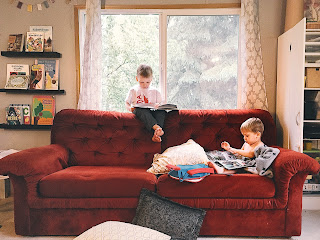Why do we feel the need to label the behavior at all?
The adult judges the child's actions as good or bad from the viewpoint of his own relations with the child. - The Secret of Childhood, Maria Montessori
I believe it actually has more to do with our reaction than the child's behavior.
Because when a toddler screams at us, it can make us feel frustrated, angry or at a loss.
And if this behavior breaks out around other people, we feel embarrassed, ashamed, uncomfortable.
How does the behavior reflect on my parenting? On my ability to control my child?
When our children act out, we want them to stop. In fact, we are generally more interested in stopping the uncomfortable or embarrassing behavior than in discovering the why behind it.
At least, I know I was.
The Five Step Tantrum Solution
(I have developed these steps after listening to Janet Lansbury's podcast Unruffled which offers many comprehensive and practical guides through parenting situations and how to deal with them.
Listening to this podcast has been monumental and I seriousrecommendend it. If you have a specific question I can almost guarantee she has an episode that will guide you through it. I am not an expert, but she is, and I can one hundred percent vouch for what she teaches.)
Helping Your Child Through a Tantrum
Give yourself a minute. If your kid just screamed in your face, its okay to need a minute to take a breath and go to a zen place. (I literally say I am zen sometimes, at first as a joke, but now as a reminder)
You need to come to your child from a place of calm and understanding, so this step is crucial.
Step Two:
Don't take it personally. Your child's need to express their big emotions, and their difficulty in doing so in a mature manner, is totally normal and healthy. You haven't bombed parenting. Your two year old will likely develop better methods of dealing in the next few years.
Step Three:
Do not engage. Now this is probably the most difficult part, but bear with me.
If your toddler is trying to hurt, you can calmly hold their hands, and stop them from doing so. At this point, they are not in a reasonable frame of mind, so scolding or trying to reason with them or question their motives, will not be effective or necessary.
If your toddler is screaming, you can acknowledge them by saying I hear you or calmly making eye contact with them, and then looking away without looking fazed by it. Trust me when I say this is the surest, and quickest, way to take the wind out of your toddlers scream.
Do not get angry, frustrated, or lose control in any other way, if you can help it. (And I realize we are all human so this may happen sometimes. That's okay, again, you are not bombing parenting. Just try again, you'll have another shot at it.)
Side note:
Only remove the child from the situation if they really cannot seem to stop causing harm. This can be to themselves, other people, or the environment. Removing them completely from the situation can sometimes be an overreaction, communicating to them that you, and they, are uncontrollable - which is the opposite message you want to send.
You want to assure them that you are in control, and that they are capable of regaining control as well. But sometimes, they do need a bit of quiet and space to calm down.
Step Four:
Offer understanding, even if the tantrum seems completely arbitrary.
I understand that you are upset/frustrated/sad.
I know that you really wanted another cookie.
I see that you are angry with me and want to hit me, but I will not let you hurt me. I am going to hold your hands until you are ready to have a calm body.
Let it go. This is the second hardest part for me.
Once the tantrum has fizzled out, it feels like we need to parent it. There have been times where I felt like I needed to absolutely beat the issue to death trying to talk through what happened.
But, that's not actually what your child needs.
In this moment, your child is back from that unreasonable place.
They know they have screamed, hurt, thrown, etc, when they are not supposed to. Children are perceptive and intelligent. They likely only need to be told not to do these things once or twice.
Your child needs the assurance that you love them even at their worst. They need your calm. They need your stable. They need to know that, even when they do something you don't want them to do, they are worthy of forgiveness.
They need to work together, with you, toward a solution or redirection.
You were pretty upset with me, would you like a hug?
You really wanted a cookie. You must be really hungry? Do you want to help me make lunch?
You were really upset that mommy was busy with the baby and couldn't help you. Would you like some help cleaning up the toys you threw? Mommy will finish feeding the baby and then I will come and help you right away.
Or just a simple: I love you.
Hope this post was helpful. We have been struggling with knowing how to handle our son's tantrums for years, and with not wanting to label him. Attempting to follow these steps has made the biggest impact. I seriously encourage you to try them, as well.
Thank you for reading! If you have any questions or comments, please feel free to contact me. I would also love to hear any suggestions for posts you would like me to write about. And if you are interested in following along in our daily adventures, follow us on Instagram where I post daily.
God bless,
Olivia Fischer




No comments:
Post a Comment